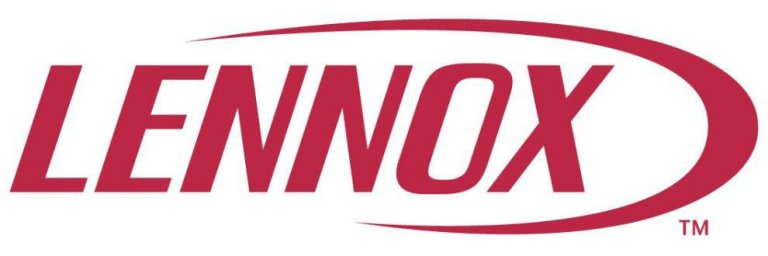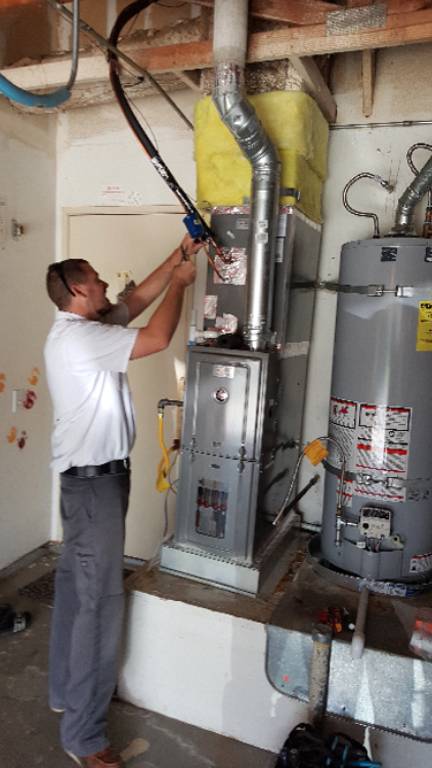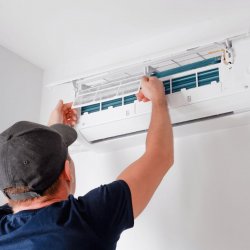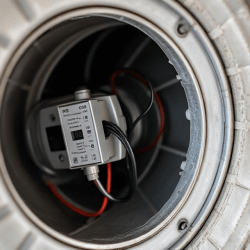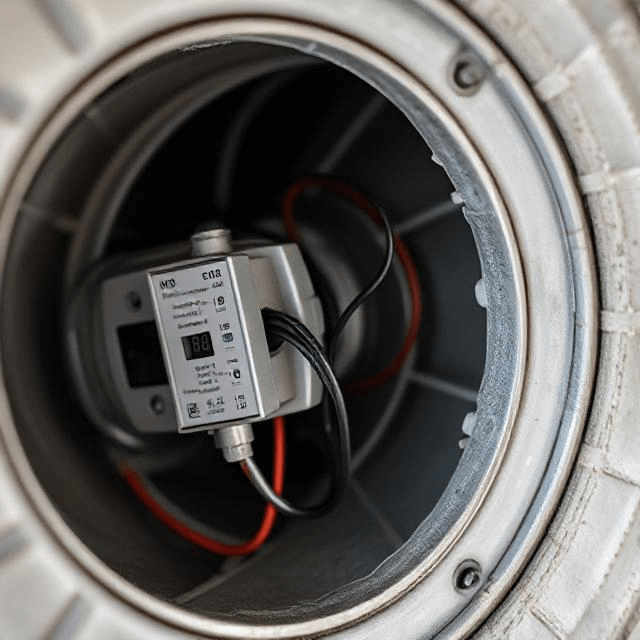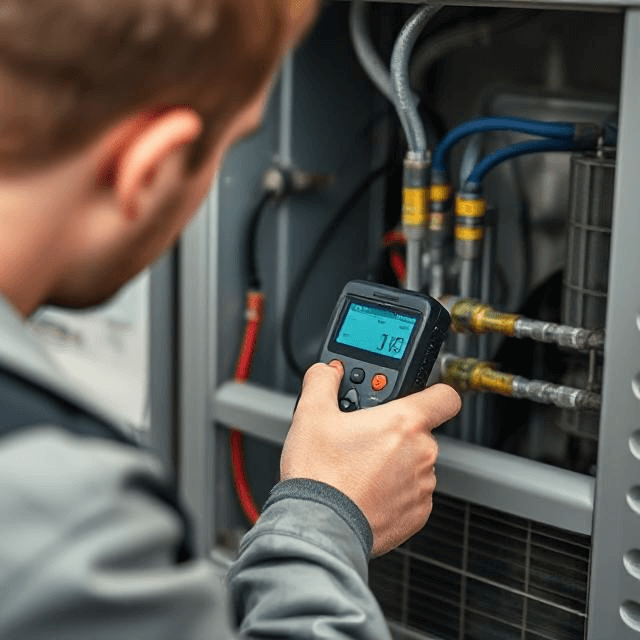Deciding between a furnace and a heat pump is a hot topic for homeowners. While both systems function to keep the indoor temperature warm, they differ in heating capabilities, efficiency, use of space, and cost.
This decision becomes particularly crucial as the seasons change and a reliable, cost-effective heating solution becomes necessary.
In the guide below, we will discuss the debate on furnaces vs. heat pumps and help you choose the most comfortable heating option for your home.
Understanding Furnaces
Furnaces have been a reliable part of home heating for decades. These systems operate by heating air within the furnace and then distributing that warm air throughout the home via ductwork.
The two main types of furnaces include:
- Combustion Furnaces: These types burn fuel (gas, oil, or propane) in a combustion chamber to create heat.
- Electric Furnaces: Instead of burning fuel, electric furnaces use electricity to heat elements that warm the air.
Advantages of Furnaces
- Powerful Heating: Furnaces generate high heat levels, perfect for areas hit by severe winters.
- Speed of Heating: They quickly warm up your home, offering fast comfort from the chill. This swift heating ensures you’re not left in the cold for long.
- Longevity and Durability: A well-maintained furnace boasts a lifespan of 15 to 20 years, sometimes even more. This makes them a long-term heating solution for your home.
Disadvantages of Furnaces
- Operational Costs: The cost to run a furnace can vary, heavily influenced by the type of fuel used and its local price. This means that the expense can significantly increase during the winter when usage peaks.
- Installation and Maintenance: The requirement for external venting makes installing gas and oil furnaces more complex. Moreover, they demand regular upkeep to operate safely and efficiently.
- Space Requirements: A furnace requires part of your home for its installation. This need for a specific space could be a drawback in homes with limited space.
Understanding Heat Pumps
Heat pumps are versatile and energy-efficient alternatives to traditional heating systems. Unlike furnaces, which generate heat, heat pumps work by transferring heat from one place to another. This makes them an all-in-one solution for both heating and cooling requirements.
The main types of heating pumps are:
- Air-Source Heat Pumps: These units extract heat from the outdoor air to heat the home during winter and reverse the process to cool it in the summer.
- Ground-Source (Geothermal) Heat Pumps: These systems use the ground’s stable temperature to provide heating, cooling, and hot water. They are more expensive to install, but they offer unparalleled efficiency.
Advantages of Heat Pumps
- Energy Efficiency: Heat pumps are useful, especially in mild to moderate climates. They transfer heat instead of generating it, which typically consumes less energy.
- Dual Functionality: Providing both heating and cooling, heat pumps eliminate the need for a separate air conditioning unit. This saves space and installation costs.
- Reduced Carbon Footprint: As heat pumps can operate on electricity, they offer an eco-friendly alternative to furnaces that burn fossil fuels.
- Operational Cost Savings: Although the upfront cost can be higher, heat pumps’ lower operational costs can lead to savings on energy bills over time.
Disadvantages of Heat Pumps
- Reduced Efficiency in Extreme Cold: In very cold climates, air-source heat pumps may struggle to extract heat from the outside air. They often require a supplemental heating source.
- Higher Initial Investment: The installation cost for heat pumps, especially ground-source models, can be higher than that for traditional heating systems. However, various incentives and rebates can help offset these costs.
- Space Requirements for Ground-Source Systems: Installing a ground-source heat pump system requires sufficient outdoor space for the ground loop, which can be a limiting factor for some properties.
Quick Comparison: Furnace vs. Heat Pump
Feature | Furnace | Heat Pump |
Heating Method | Generates heat through combustion or electric resistance | Transfers heat from outside to inside |
Climate Suitability | Best for cold climates with harsh winters | Best for mild to moderate climates |
Energy Efficiency | Depending on the model, modern furnaces can be very efficient | Generally more energy-efficient, especially in suitable climates |
Installation Cost | Generally lower upfront costs | Higher initial costs due to dual functionality |
Operational Cost | Can be higher due to fuel prices | Lower in mild climates due to efficiency |
Maintenance | Requires annual inspection; maintenance of vents/chimneys | Benefits from bi-annual service; keeping units clear of debris |
Lifespan | 15-20 years, sometimes more | Varies, but generally around 15 years |
Cooling Capability | Requires separate AC unit | Provides both heating and cooling |
Environmental Impact | Higher carbon footprint due to combustion (except for electric furnaces) | Lower carbon footprint, operates on electricity |
Comparing Energy Efficiency Between Furnace and Heat Pumps
Local climate plays a key role when comparing the energy efficiency of furnaces and heat pumps.
Generally, heat pumps excel in mild to moderate climates by efficiently transferring heat from the outside. This makes them more efficient in areas with less severe winter chill. They also operate with lower energy consumption, leading to reduced utility bills.
Furnaces, on the other hand, prove their worth in colder regions by generating intense heat, regardless of outside temperatures. Modern high-efficiency furnaces are ideal for areas battling freezing winters for their ability to convert over 90% of their fuel into heating your home.
Maintenance Requirements of Furnace and Heat Pumps
Maintaining your heating system is essential for efficiency, longevity, and safety.
Furnaces require annual professional inspections for safe operations, especially to prevent carbon monoxide leaks in combustion types. The filters need replacement or cleaning every 1-3 months. For combustion furnaces, keeping vents and chimneys clear is also crucial.
Heat pumps, used year-round, benefit from bi-annual professional services to prepare for both the cooling and heating seasons. Keep the outdoor unit clear of debris and snow. You should also regularly clean or replace the filters to prevent overworking the system.
Cost of Furnace vs. Cost of Heat Pumps
The initial cost and long-term expenses of furnaces and heat pumps vary.
Generally, the upfront installation cost of a heat pump is higher than that of a furnace due to the heat pump’s dual functionality of providing both heating and cooling. However, the operational costs of running a heat pump are typically lower in mild to moderate climates, thanks to their energy-efficient design.
Conversely, furnaces often have a lower upfront cost for both purchase and installation than heat pumps, making them an attractive option initially.
However, the expenses associated with the fuel needed to run a furnace can accumulate, especially in colder climates where the furnace is in constant use. These operating costs can significantly impact the furnace’s annual expenses.
Making the Right Choice for Your Home
Furnaces are particularly well-suited for homes in colder climates where temperatures frequently drop below freezing. They offer a robust solution that can keep up with the demanding heating needs of such environments. A furnace ensures your home remains warm and comfortable even in winter.
On the other hand, heat pumps are a great option for homeowners looking to heat and cool their homes efficiently and environmentally friendly. Ideal for climates with milder winters, they provide a cost-effective solution over the long term.
Choosing between a furnace and a heat pump ultimately depends on your specific needs, budget, and climate. Considering these factors, you can select the most comfortable and efficient heating option for your home.
Select the Best Heating System with Season Control
At Season Control, we understand the importance of making an informed decision about your heating and cooling systems. After all, the right system ensures your home is comfortable, energy-efficient, and cost-effective.
Our experienced team is here to guide you through the complete selection process by offering advice tailored to your specific needs. Trust Season Control for the best service, from evaluating your home’s heating needs to expertly installing your chosen system.
Ready to find your ideal heating solution? Give us a call at (818) 514-4914, and let’s make your home warm and welcoming!
